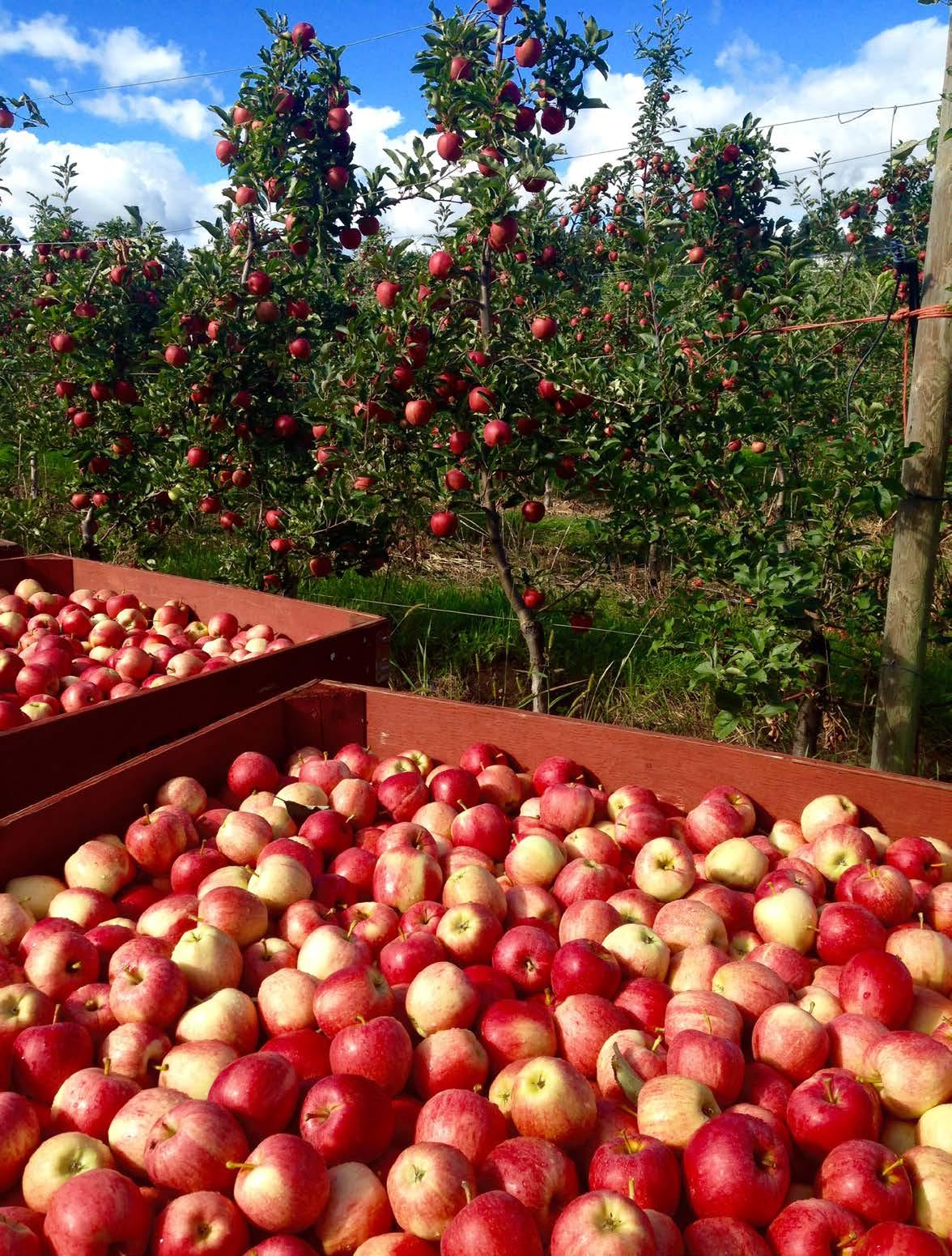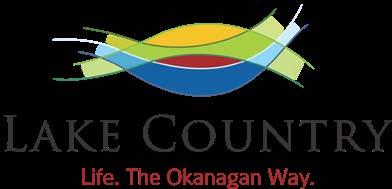






Nestled in the scenic Okanagan Valley, Lake Country is uniquely located on the shores of three magnificent lakes, no doubt a key reason the community continues to outpace the provincial growth rate as people flock here to experience Life. The Okanagan Way.
Lake Country is part of the Central Okanagan, the largest population centre between Vancouver and Calgary. It sits between Vernon and Kelowna along Highway 97 and boasts easy air access via the Kelowna International Airport. The community is a hub of growth and innovation for tourism, agriculture, technology, business and the arts.
Lake Country includes four distinct wards; Carr’s Landing, Okanagan Centre, Oyama and Winfield. Okanagan Lake is Lake Country’s western boundary and Wood Lake sits in the middle of the community with an isthmus separating Wood Lake and Kalamalka Lake, the southern portion of which is within Lake Country’s boundaries. Comprising a geographic area of 122.16 square kilometres, Lake Country offers a balance of rural and urban experiences with its major industries being agriculture and tourism. Forty per cent of the land in the community is within the Agricultural Land Reserve and major crops include apples, peaches, pears and cherries. Serene lakes, exquisite orchards and vineyards, miles of sun-drenched landscapes and exciting outdoor adventures; this is what makes Lake Country the perfect setting for work and play.

I am very pleased to present the 2022 Annual Report. The report actually does much more than highlight what happened last year. It shows you our current strategic priorities and our plans for the future. It presents information on capital projects that will be underway for years and highlights relationships that we have fostered for decades and plan to continue forever.
I believe strongly in community and feel blessed to live in Lake Country. My wife and I bought our first home in Okanagan Centre in 1987 and raised our two children in what we consider the best community in Canada. I have seen it grow and change immensely in that time. I am honoured to follow in the footsteps of James Baker who served as Mayor for 17 years.


With change, however, comes opportunity, and Lake Country’s Council has changed. While I am new to the mayor’s role, I have served two terms on council, but I bring fresh ideas to the table. Two fellow members of past council, Councillor Cara Reed and Councillor Todd McKenzie, join me in welcoming four new faces to Lake Country Council: Councillor Tricia Brett, Councillor Michael Lewis, Councillor Heather Irvine and Councillor Bib Patel. With the new energy and ideas from first-time councillors, joining the tremendous experience brought by returning members, I look forward to making the changes that our community needs, and face new challenges and incredible growth as we tackle the governance of Lake Country. We will work to address the pressures that come from the rate of growth Lake Country has experienced (Lake Country has grown 28.5% since 2016). Our infrastructure, roads, drinking water, sewer treatment, parks, amenities and much more, must keep up with the pace of growth. We will need to think about the impact climate change is having on our environment. We will engage with the public on the stra-
tegic, long-term goals for this great community. We will also seek help from other levels of government to achieve some of our goals, including affordable housing. We are not alone in providing important services to our community, and we will work to ensure our voice is heard at the provincial and federal government level.
I am prioritizing building relationships with our neighbours, large and small, provincial ministries and the federal government. We need partners to grow our infrastructure to keep pace with the demands of housing and growth. I am also building relationships with the development community to attract the best to help that growth move in a positive direction and to bring businesses and light industry to Lake Country to provide jobs and services in our own town. Communication with the public will always be a high priority during this term. I want to help our residents understand the challenges Council faces, and the opportunities that may reveal themselves. I encourage members of the Lake Country community to connect with Council, get involved and answer our calls for input. Visit www.lakecountry.bc.ca/subscribe or find us at www.lakecountry.bc.ca/mayorandcouncil.
Blair Ireland,Airport Advisory Committee
Central Okanagan Development Commission
Parks and Recreation Advisory Committee
Public Art Advisory Commission
Regional District of Central Okanagan Board
UBCO Regional Leadership Table Water Services Advisory Committee







Airport Advisory Committee (Alternate)
Lake Country Health Society (Alternate)
Parks and Recreation Advisory Committee (Alternate)
Tourism Kelowna Water Services Advisory Committee

2022 FAST FACTS
203 Council Resolutions
60 Council Meetings & Public Hearings
181
181 Letters from the Public 6 Council Committees
Lake Country Health Society
Lake Country Seniors Housing Society (Alternate)
Municipal Insurance Association of BC
Okanagan Regional Library Board (Alternate)
Regional District of Central Okanagan Board (Alternate)
Water Services Advisory Committee (Alternate)
Winfield Senior Citizens Society
Parks and Recreation Advisory Committee
Public Art Advisory Commission (Alternate)
Safe Schools Committee
Winfield Senior Citizens Society (Alternate)
Lake Country Seniors Housing Society
Central Okanagan Development Commission (Alternate)
Okanagan Regional Library Board
UBCO Regional Leadership Table (Alternate)
Public Art Advisory Commission
Safe Schools Committee (Alternate)
Tourism Kelowna (Alternate)
Lake Country, Living the Okanagan Way. Embracing our Histories and Nurturing our Future.
To nurture a healthy natural environment, strong rural character and urban core, sustainable infrastructure, economic opportunities, an inclusive community with involved citizens, through respectful, transparent government, focused on balanced strategic decision making.
Support quality development that respects public safety, environment and community needs Finish what we started
Well maintained infrastructure and facilities that meet community needs and allow growth and development for prosperity.
Building a strong and vibrant community by attracting, supporting and retaining businesses and residents.


Fiscally sustainable government focused on strategic decision-making, transparency and inclusiveness.
Maintaining a healthy and natural environment through responsible use, protection and sustainable practices.

Building Social Capital and engaging citizens and partners to improve the well-being and diversity of the community.

• Development underway on Stage 3 of Liquid Waste Management Plan.
• Phase 4 improvements to Wastewater Treatment Plant underway.
• Water Master Plan preferred options prepared.
• Provided input into the Ministry of Transportation’s Central Okanagan Integrated Transportation Strategy.
• Adopted Mobility Implementation Plan.
• Consultation complete with Lake Country Business Park landowners.
• Economic Development Strategy Draft developed.
• Recommended amendments to the Zoning Bylaw’s agricultural policies prepared for review by Agricultural Advisory Committee.
• Input provided for Operationalization Plan of the Integrated Transit Study.
• Indigenous Cultural Centre project manager and architect selected; design process underway.
• Ongoing collaboration with Okanagan Indian Band on multiple projects including the Liquid Waste Management Plan, Water Management Plan, Indigenous Cultural Centre and transportation network development.
• Implemented improvements to the development application and building permit process.
2022 ACHIEVEMENTS
• Workshop and Council tour undertaken as part of development of a forest and vegetation strategy and tree protection bylaw.
• Changes recommended for Development Procedures Bylaw related to environment preservation.
• Draft Master Drainage Plan nearing completion.
• Grant application submitted for FireSmart initiatives.
2022 ACHIEVEMENTS
• Recreational Needs Assessment survey undertaken, draft report prepared for Council review in 2023.
• Secure long term wastewater service delivery for the community.
• Ensure sustainable water service delivery for the community.

• Create infrastructure that meets community needs.
• Support opportunities to diversify Lake Country’s tax base.
• Implement the Agricultural Plan
• Encourage growth of the town centre core.
ONGOING OBJECTIVES
• Honour reconciliation by strengthening relationships and inclusiveness with our Indigenous partners.
• Identify and support improvements to the development process.
• Explore opportunities to engage with regional & local governments for betterment of the community.
ONGOING OBJECTIVES
• Preserve, protect and enhance our natural environment.
ONGOING OBJECTIVES
• Review existing demand and capacity, future trends and projected needs.
• Create and support opportunities for a healthy, active and inclusive community.
A Local Government provides services within its boundaries, some mandatory, some optional. Mandatory services such as potable drinking water, safety and administration of the municipality’s finances are regulated and must meet legislative requirements. Local governments cannot adjust standards of mandatory services. Optional services are provided at the discretion of Council and include policing, fire protection, garbage collection, transit, roads maintenance, sanitary sewer, parks maintenance and recreational programs. Council decides what service to provide to the community and what resources to direct to it. Council may wish to provide more or less resources, or a higher or lower level of service, in a particular area depending on availability of resources and community goals.
• Meaningful discussion/debate on desired levels of service and priorities on appropriate levels of service for the community.
• Is this a new service or altering an existing level of service?
• Review current level of service.
• Establish the capital and operational requirements to deliver the level of service.
• The annual budget process considers cost of maintaining existing services and the benefits/risks and costs of increasing or decreasing services to meet community needs based on growth, updated legislated requirements and public safety, environmental protection, sustainability and lifestyle expectations.
• Council decision on budget approval/tax increase to meet acceptable levels of service in all areas. Decisions made in the annual budget cycle are based on defined levels of service – not a wish list.
When considering an increased or decreased level of service, Council evaluates how multiple departments collaborate in the service delivery. If funding is diverted from one service to another, or levels decreased to increase another, the ramifications of the change must be carefully reviewed. New services or assets should not negatively impact the renewal and maintenance of existing services, facilities or infrastructure.
Visit our online engagement platform https://letstalk.lakecountry.bc.ca to view current public consultation initiatives.



The District of Lake Country strives to deliver established and sustainable services that:
• Comply with legislated requirements
• Protect and uphold public safety, community well-being and the environment
• Reliably provide services to meet the needs of the community according to Council’s Vision
A new service or an increase in the level of service of an existing one will cost more and therefore requires additional funding. Council’s goal is to maintain a balance between levels of service so there is enough funding and resourcing for the provision of all services.
Financial considerations when setting a Level of Service include the following:
• The cost of delivering services goes up every year due to inflation and other factors, depending on the circumstances. A tax increase is required just to keep pace and maintain the same levels of service as the previous year. Any new services or increase to existing levels of service would require a further tax increase above and beyond the amount to address rising costs.
• Money is set aside in reserves for anticipated service level increases in future years. If the cost of delivering the service goes up more than the projection in the multi-year plan, decisions must be made to either lower the scope or standard, increase the duration of the program or fund the increased cost.
• Cost, especially as it relates to taxation, is a key consideration when defining levels of service but it is not the sole determining factor. It may be appropriate to define the level of service first and then determine the cost and the best way to fund it afterwards.
Thanks to a $98,050 Canada Healthy Communities Initiative grant and funds from the Lake Country Rotary Club, Walk Around Lake Country (WALC) trail planners and builders were busy working with the District of Lake Country in 2022 to improve trail wayfinding in and around Lake Country. The project included trail upgrades, decommissioning of excess trails, installation of signage, creation of paper maps and an on-line map tool. WALC and the District of Lake Country are grateful for the support from the Canada Healthy Communities Initiative as it will make finding and navigating District of Lake Country trails easier. Jack Seaton Park has been the focus of much of the physical trail work: gravel surfacing and the installation of kiosks, trailhead signs and trail markers were funded by the Healthy Communities Initiative grant.

The Okanagan Indian Band, District of Lake Country and City of Kelowna announced agreement on a Memorandum of Understanding (MOU) that will pave the way toward building important health, safety and infrastructure improvements, including completion of the Okanagan Rail Trail.
Staff discussions among the three neighbours over many months resulted in an agreement to move toward resolving infrastructure needs. Some preliminary work is already underway on agreements to overcome historical jurisdictional challenges.
The three jurisdictions have agreed to work together to address issues of mutual interest.
For the second year in a row, the District of Lake Country received BC Municipal Safety Association’s Organizational Safety Excellence Award. The BC Municipal Safety Association recognizes local governments for activities that improve their experience rating, and ultimately reduce injuries, illness, disease and fatalities with the Organizational Safety Excellence Award. In order to be awarded the Organizational Safety Excellence Award, a municipality must demonstrate an outstanding safety record compared to peer organizations as well as year-over-year continuous improvement.

The District of Lake Country was the recipient of a Union of BC Municipalities Community Excellence Award recognizing work completed on the Liquid Waste Management Plan.

For the seventh year in a row, the District of Lake Country received a Canadian award for Financial Reporting (CANFR).
To receive the Canadian Award for Financial Reporting, a government must publish an easily readable and efficiently organized annual financial report. Lake Country’s financial reports go beyond the minimum requirements of generally accepted accounting principles and demonstrate an effort to clearly communicate the municipal government’s financial picture.
During National Volunteer Week, April 24-30, the Friends of Gable Beach Adopt-A-Road crew hit the roadsides in Carr’s Landing for a spring clean. Over the years, the crew has noticed a change in the number of garbage bags they fill up and are pleased to report far fewer bags filled than when they first started the annual clean up. People are getting the message: pack out what you pack in and help keep our environment healthy. Thanks to all the community volunteers who help make Lake Country a wonderful place to live, learn, work and play!

I am pleased to invite you to read through the District of Lake Country’s 2022 Annual Report to learn more about our activities and performance last year. In this report you will find:
• A report on District services and operations
• Audited financial statements and a list of permissive tax exemptions
• A progress report on achievements and ongoing objectives related to Council’s strategic priorities.
2022 was a very interesting year as we transitioned out of the COVID-19 pandemic and were able to again host community gatherings, such as the Open House at our new Station 71 fire hall; and the ever popular Live! in Lake Country free concerts in the park on Friday evenings; and invite you back into the Council Chamber to take in the deliberations of Mayor and Council and ask your questions or provide your input in person again. We also saw one outcome of many years of work by both staff and Council building collaboration with OKIB and Kelowna resulting in an MOU paving the way toward building important health, safety and infrastructure improvements for all our communities.
The election in the fall resulted in a number of new faces around the Council table and an experienced councillor taking on the role of Mayor. The learning curve may have been steep for some, but they have begun their work in earnest and have already shown the same level of dedication others have displayed through the years.
It is worth noting that Council’s focus is still on nurturing a healthy natural environment, strong rural character and urban core, sustainable infrastructure, economic opportunities, an inclusive community with involved citizens, through respectful, transparent government, focused on balanced strategic decisionmaking.
We thank you for your input, questions and opinions throughout the year in person, via email, and particularly through the Let’s Talk – Lake Country public engagement platform, that help Council know what your priorities are that should be considered in their regular decision-making process. After you have reviewed this document, I invite you to provide us with feedback and ideas to make this document better and, more importantly, to make our community an even more amazing place in which to live, work, learn and play.
Tanya Garost Chief Administrative OfficerTanya Garost, Chief Administrative Officer

Reyna Seabrook, Director of Corporate Services
Matthew Salmon, Director of Engineering and Environmental Services
Trevor James, Director of Finance and Administration
Matt Vader, Director of Parks, Recreation and Culture
Jared Kassel, Director of Planning and Development Services
Greg Buchholz, Director of Utilities
Darren Lee, Fire Chief

The Corporate Services Department oversaw the 2022 Local General Election and the Waterfront Property Referendum. A total of 2,020 ballots were cast in the community during Advance Voting Days, General Election Day, and ballots received by mail. The majority of voters also indicated opposition for borrowing up to $8,000,000 to purchase waterfront property for community use. There were 929 in favour and 1,063 opposed when asked on the ballot: “Are you in favour of the District of Lake Country authorizing Loan Authorization (Waterfront Property) Bylaw 1187, 2022 to authorize the borrowing of up to $8,000,000 to purchase waterfront property for community use?”

The department oversaw the final meetings of the 2018-2022 Council and the election of the 2022-2024 Council. The inaugural meeting of the newly-elected Council was November 6 and the mayor and councillors were sworn in by Justice David Ruse. Council and Council orientation sessions.



Corporate Services administers Council agendas and minutes, bylaws, land negotiations, Freedom of Information requests, electoral processes and customer service as well as bylaw services and enforcement for the community. In addition, Corporate Services oversees clerical positions at the Lake Country RCMP Detachment.
The District sponsored an application to the Agricultural Land Commission to remove 7.28 hectares within six parcels of land from the ALR located in the Glenmore industrial area. The parcels are within the boundary of the Area Services Plan to be completed by the District in 2023. The plan is the beginning of the redevelopment of the Glenmore Industrial lands and removal of the ALR designation is required prior to the redevelopment. The ALR is BC’s provincial zone that preserves agricultural land for the future. Portions of the six parcels in the District’s exclusion application are within this zone but are not currently used for agricultural purposes. Although led by the District, the private owners of these parcels are in agreement with the request to remove the ALR designation. The Agricultural Land Commission will make the final decision.
2022 FAST FACTS
18 FOI Requests
2,020 Election Ballots Cast
Lake Country Municipal Hall’s flag was lowered to half mast for the death of Queen Elizabeth II on September 8, 2022. On Monday, September 19, District of Lake Country offices were closed for the federal holiday to observe the funeral of Her Majesty Queen Elizabeth II.

Glenmore Road got a pavement overlay from Shanks Road to just past Peter Bros. pit in October 2022 as part of the Interim Pavement Renewal Program which extends the life of road surfaces that are deteriorating at a rate disproportionate to scheduled renewals. Council approved an adjustment to the capital budget funding for the program to add sections of Glenmore Road and sections of Beaver Lake Road in addition to the already included sections of Shanks Road and Pixton Road. The adjustments were supported due to deterioration of the roads requiring immediate repairs. Program road work cost an estimated $600,000 every two years.


Building up on the Mobility Master Plan, adopted in 2021, the Mobility Improvement Program, adopted in September 2022, provides an updated improvement and renewal program in line with the goals of the master plan. Roads are classified by condition and function and the program recommends improvement projects for Lake Country’s road network with a five, ten and twenty year time frame with an estimated cost of $69.6 million to meet the recommendations.
As part of ongoing mobility planning in the District, a survey was conducted asking for feedback on Carr’s Landing Road, from Okanagan Centre West Road to Commonage Road. There are a number of active tasks the District is either leading or supporting that require the future mobility needs of Carr’s Landing Road to be confirmed prior to proceeding. The input helps the District develop an understanding of road safety issues, determine how people travel and where they travel within the neighbourhood, identify existing and desired active transportation use and develop solutions to resolve issues and accommodate users.


The Master Drainage Plan will provide guidance related to land use, the environment, climate change, finance, and governance as well as project cost estimates for capital planning and strategies to manage drainage resources. The District’s existing policy documents such as the OCP, Subdivision and Development Servicing Bylaw, the Highways Bylaw and the Stormwater Management Bylaw will be Integrated into the Master Drainage Plan.
Engineering and Environmental Services is responsible for technical support in civil engineering matters including subdivision and land use servicing reviews (Developmental Engineering), road maintenance, renewal and improvement, mobility and public transit as well as solid waste and recycling.
2022 FAST FACTS
207 Kilometres of Roadway
59 Kilometres of Sidewalks & Bike Paths

156 Kilometres of Recreational Trails
Davidson Road, from Camp Road to McGowan Road, was improved in 2022. The project included a sidewalk, curbing, road renewal and drainage upgrades and was initiated as part of the safe routes to school initiative. This portion of Davidson Road serves to connect neighborhoods to Davidson Road Elementary school. Additionally, the road surface was in poor condition and required repair to the road structure and a solution for drainage. The project cost an estimated $1.1 million.
Phase 1 – 2022: Travel mapping was undertaken to understand current travel patterns in order to develop options for alternate/additional service design and service level opportunities. A goal of the Integrated Transit Study is to develop a toolbox of options that will support increased transit ridership.
The District launched Lake Country’s Farm Gate Trail, a program to highlight the great local farms and encourage residents and visitors to shop locally. Each participating farm is given a sandwich board to advertise on their property and their farm is listed on an interactive online map. Check it out at www. visitlakecountry.ca


As part of a organization-wide technological upgrade, the District launched a new system to streamline online requests for service from the public. The new system allows users to quickly and easily submit non-emergency requests for roads and utilities services and bylaw enforcement; or Report a Problem so the issue and response are directly tracked in the system.
The District announced the Data Portal CityViz is now live and can be accessed through lakecountry. bc.ca. The user-friendly data portal makes information, research, and analysis instantly accessible to community stakeholders and businesses seeking data to make informed decisions. Users have the ability to visualize data with interactive tools, charts, graphs, infographics, and reports that can be dynamically sorted and downloaded. Providing users direct access to thousands of data points and the most accurate, up-to-date information on the community and the region helps build a concise picture of the breadth of opportunity and value of investing and growing within Lake Country and the Central Okanagan.
Economic Indicators specific to Lake Country can now be found on the lakecountry.bc.ca website. Thinking of starting or moving your business to Lake Country? This is a great starting point to find community specific information that will help your business grow and succeed.
Finance and Administration is responsible for all financial services of the organization including taxation and budgeting as well as payroll and accounts receivable and payable. The Department also oversees communications, human resources and occupational safety and information technology.
2022 FAST FACTS
6,949 Property Tax Notices Issued
$14,486,820 Property Tax Collected
$5,664,959 Utility Revenues
1,014 Business Licences

The Department launched www.visitlakecountry.ca, a dedicated website for tourism-related information that supports local businesses and attractions by providing additional exposure.

The site promotes, among other things, local events like the Farmers’ Market and Oyama Fun Day, as well as the Farm Gate Trail and the Scenic Sip Wine Trail. Listings provide information to anyone looking for a place to stay, somewhere to eat, or something new to try in Lake Country.

Lake Country also undertook a pilot project for a Mobile Visitor Centre, travelling throughout the community from May to September.


The free, Friday evening Live! In Lake Country summer concerts were a hit with Lake Country residents and visitors. After temporary pandemic restrictions curtailed gatherings in 2020 and 2021, music lovers were eager for the Live! In Lake Country concerts in Swalwell Park. This year the Lake Country Farmers and Crafters Market, also located at Swalwell Park on Fridays, extended its hours to 8 p.m. to accommodate concert goers. A food truck on site as well as a Kids Zone which hosted fun activities for the youngest attendees helped create a festival atmosphere every Friday night. Creekside Theatre: 32 shows and 8783 tickets sold.

Lake Country provided the following community hall and community engagement grants in 2022:
• $24,000 - Oyama Community Hall
• $5,000 - Okanagan Centre Community Hall
• $7,100 - Winfield Memorial Hall
• $3,000 - Lake Country Riders for work on the Jack Seaton Mountain Bike Trails.

• $1,000 - Lake Country Tennis Association to replace the windscreen at Woodsdale Tennis Courts.
• $1,000 - Lakestone Community Amenities Association for the removal of invasive species and the replanting of indigenous plants at Waterside Park be approved.
The District launched the Lake Countree program, a residential planting initiative developed to encourage citizens to help grow and preserve Lake Country’s urban forest canopy. It was the first year for this new initiative. Lake Country residents could purchase one tree per household for the low price of $50. All of the tree varieties on offer were chosen for their hardiness to endure the weather of the Okanagan region. By purchasing and planting a tree through the Lake Countree program, participants made a positive impact on the environment. The program was a tremendous success with 100 per cent of the trees sold.


Approximately $350,000 in upgrades were completed at this key community gathering place enjoyed by residents and visitors. The project addressed functional issues including replacement of the washroom building and septic field, and included the new site furniture and picnic areas, additions to the play environment, planting of shade trees and improvements to accessibility. The amenities within the park, such as the washroom building, also serve to benefit beach and trail users along the shoreline.
Parks, Recreation and Culture is responsible for building and maintaining the District’s parks, public green spaces and indoor and outdoor recreational spaces as well as coordinating recreation opportunities, the community theatre, Live! In Lake Country performances and other public art and cultural events. The department is responsible for facility maintenance and operations.
2022 FAST FACTS
221 Recreation Programs
28,750 Recreation Program Attendance
2,394 Registered Participants
The community was engaged to provide input into a sports and recreation needs assessment. Participants, including user groups, service clubs and school students, were asked about current facility utilization and where facility investments should be prioritized within a 15 year time period. Over 600 plus 40 community groups took the online survey, the results of which will help Council better understand future needs and priorities for sports and recreation services, including facilities and programming, for our growing community.
The Household Questionnaire was fielded to gather resident insights on sport and recreation needs, satisfaction levels, factors that influence facility use and participation and well as future priorities. To provide an unbiased data sample, a coded methodology was used. Postcards with a unique access code and instructions on how to complete the questionnaire were sent to households in the District. While the online version of the questionnaire was the primary completion method for most, a paper copy option was also provided. In total, 442 coded questionnaires were completed which provides a margin of error of +/- 4.6%.1
10,400 Live! In Lake Country Attendees (avg 1,300 per event)

The Building Division of the District of Lake Country implemented changes that will make serving customers more efficient and effective. The District of Lake Country has been administering a record number of building applications since 2019. In 2021 the District issued 363 permits with a construction value of $92 million and in 2022 there were 260 permits issued with a construction value of $68.6 million.
To address applications more efficiently, the following has been undertaken:
• Dedicated Appointment Time for New or Complex Applications
Building Division staff appointments can be booked by calling 250-766-6675. Scheduled meetings allow Building Division staff to effectively split their time in office and in the field. Scheduling will also give time for staff to prepare and review the files for the meeting which isn’t alway s possible with unscheduled, drop-in appointments.
• Dedicated General Inquiry Time
Building Division staff will be available to take general inquiries at two dedicated times during each business day. These one-hour windows are from 9 to 10 a.m. and 3:15 to 4:15 p.m. every day. Building staff will be available on a first come first service basis and will limit conversations to under 15 minutes if possible.
• One Point of Contact
All new applications are now assigned a Plan Reviewer who will act as the file’s one point of contact until a building permit is issued. When a Building Permit is issued the file will be managed through the general Building Division as multiple inspectors may visit the site as the permit is concluded.
• Application Progress Posted Weekly
The District provides a weekly update of the status of current Building and Planning applications on its website: www.lakecountry.bc.ca/buildingandplanning.

Planning and Development is responsible for land use planning as well as building and development applications and all related functions. The department is divided into two divisions; Land Use/Policy Planning and Building Inspections.

2022 FAST FACTS
The Planning & Development Department hosted a Development Community Forum to provide an update on department activities and seek feedback regarding development application processes. Members of the development community were invited to attend the meeting.

Planning & Development staff provided an overview of the department and applicable legislation and planning regulations and sought input from stakeholders on the department’s application approval processes.
15 Secondary Suite Applications
68,646,842 Building Permit Value
19 Demolitions
62 Residential Additions
45 Single Family Dwelling Applications
12 Retaining Walls
Congratulations to our three Fire Chiefs for a Day who spent a great morning enjoying homemade firehall waffles and visiting with the other Chiefs during National Fire Prevention Week. On Friday, Oct. 14, Declan from Peter Greer Elementary, Kaius from Davidson Road Elementary and Georgia of Oyama Traditional School -- our Chiefs for the Day -- toured the fire hall and got a ride back to school in a fire truck. They’re new ambassadors to spread the word about fire safety. HUGE thanks to all firehall staff and SPARKY for the wonderful program and hospitality!

New Fire Chief, Darren Lee, took over from Chief Steve Windsor who retired April 29. Darren Lee has extensive experience in emergency services with a progressive career in fire service in BC spanning over twenty-nine years. Darren most recently worked as the Fire Chief for the City of Abbotsford where he was a key member of the team that lead the City’s response to the 2021 Atmospheric River.
Firefighters in fire trucks once again headed door to door in Lake Country neighbourhoods on December 4 and 6 to collect non-perishable donations for the Lake Country Food Bank. More than 7,000 pounds of food and over $10,000 in donations were collected.
The Lake Country Fire Department announced a new LCFD Legacy Leadership grant program to its members. The program is a unique new support for career advancement in fire service leadership specifically for active LCFD members. The Department was the beneficiary of $100,000 donation from a supporter in the community.
The goal in establishing this endowment fund with the investment income to be awarded in the form of grants, is to inspire paid-on-call members to excel in fire service leadership through training, development, coaching and education which is over and above the regular first response training provided to the membership. The LCFD Legacy Leadership Fund will be invested as an open endowment fund through the Central Okanagan Foundation. Assistance in administration of the LCFD Legacy Leadership Grant program will be provided by the District of Lake Country.
Individuals and organizations are welcome to contribute to the endowment fund to speed its growth and sustainability in supporting Lake Country paid-on-call firefighters providing first response service to the growing community.
Wildfire fuel mitigation work was done on two sections of Spion Kop this winter under the direction of the provincial Ministry of Forests.
Residents in the north end of The Lakes neighbourhood, and the Raven Ridge area of Carr’s Landing, noticed crews and small equipment working on pruning and cutting. In the interest of public safety, all trail users were asked to pay attention to signage and avoid active work areas.
The Lake Country Fire Department hosted a community open house at the new Fire Station 71 on May 28 to provide tours of the new facility and educate the community on FireSmart principles and fire prevention.


Protective Services provides emergency services, participates in the regional emergency and rescue programs and is responsible for fire inspections on commercial and industrial buildings, businesses, daycares and schools.
2022 FAST FACTS
426 Medical Calls
241 Fire & Alarms
97 MVA & Rescues
86 Other Calls
2022 Sewer FAST FACTS
77 Kilometres of Sanitary Sewer
13 Sewer Lift Stations
The District of Lake Country also takes care of 3 satellite systems including the Army Sanitary System in Oyama, Marshall Sanitary System and Whitson-Nuyens Sanitary System, both located in the Carrs Landing Area.
The District’s Wastewater treatment plant treats on average 1,934 m3 of wastewater per day (or a total 628,566 m3 of wastewater in 2022).

During 2022 the District of Lake Country used a $30,000 grant from Okanagan Basin Water Board (OBWB) for work needed to update their Okanagan Lake Source Protection Plan. Source water refers to the point where our drinking water originates and polluting of source waters has become a growing concern.
Wildfires and flooding are factors that contribute to the problem, but so can backcountry activity including recreation, mining, forestry, ranching and illegal dumping. OBWB’s Water Conservation and Quality Improvement (WCQI) grant program shines a spotlight on improving ways to manage water, to mitigate current and future problems, and to protect the environment and communities in the Okanagan.
The primary aim of the 2022 source protection plan work was to update the former plan and study the effects of the White Rock Lake Fire. This section of the study involved monitoring the water quality impacts on the nutrient regime of the north basin of Okanagan Lake through sampling creek plumes and nutrient conditions. The report quantifies water quality effects from the fire, enabling the formation of future actions and will be shared with other water suppliers in the north basin including RDCO, RDNO and OKIB to encourage collaborative approaches to water management.
• To date nearly 300 community members have participated in the on-line survey
• Majority of respondents are from the Winfield Ward.
• Meetings with Eastside Utility Customers and Carr’s Landing Community have been scheduled.
• Eastside Utility Customer Meeting – May 31 (online)
• Carr’s Landing Community Association – June 1(online and in person)
Residents were advised of changes to their Utility Invoices in 2022; some residents even receiving their first ever Utility Invoice from the District of Lake Country. Administrative changes for processing invoices mean property owners in Lake Country will now find garbage, recycling and sewer user fees, if applicable, on their Utility Invoices in addition to the usual water user fees. In the past, the District has included garbage, recycling and sewer on Property Tax Notices.
Improvements to an existing sanitary sewer lift station located on Woodsdale Rd. Existing system mechanical and electrical components within the lift station have been assessed and identified to be in need of replacement or improvements. Combined with these system replacements will be confined space entry safety improvements to the lift station.
Project Cost: $300,000
Water distribution system improvements, including a new PRV station at the south end of Hare Road.
The District has secured a statutory right of way for a new watermain from Nighthawk Road down to Hare Road. This provided service for 3 lots within the Nighthawk subdivision including required fire flows, and allows the District to upsize the watermain down Hare Road; connecting back to 6th Street thereby improving fire flow and conditions for the surrounding area.
Project Costs: $1,100,000
To ensure its information technology operations weren’t vulnerable to a power outage, the District installed a back up generator for Municipal Hall. Now, in the case of an extended power outage, the back up generator will ensure power security for the District. The project cost approximately $250,000.

Utilities is responsible for the maintenance and construction of critical infrastructure in the community. The areas of responsibility include water distribution and quality, liquid waste and the liquid waste treatment plant, the sewage system and the hydrogeneration plant.
2022 Water FAST FACTS
6 Storage Dams
10 Reservoirs
200 Kilometres of Water Distribution Mains
516 Hydrants
9 Water Pumphouses
6 Chlorine Injection Systems
The District of Lake Country provides water to 5,135 residential connections, servicing approximately 11,550 people, and over 1,000hectares of agricultural land
A fulltime traffic member was added in 2022 and the Lake Country RCMP were able to re-introduce the School Resource Officer. Looking forward to 2023, the detachment will be expanding the General Investigation Team.
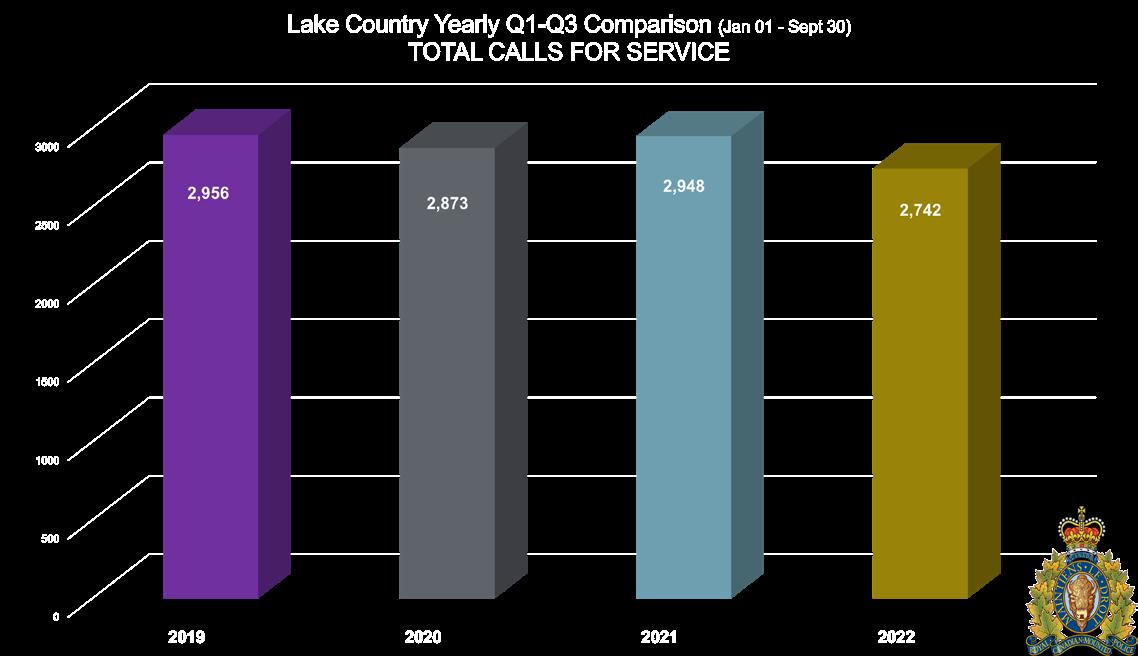
CALLS FOR SERVICE GRAPH:
COST PER CAPITA
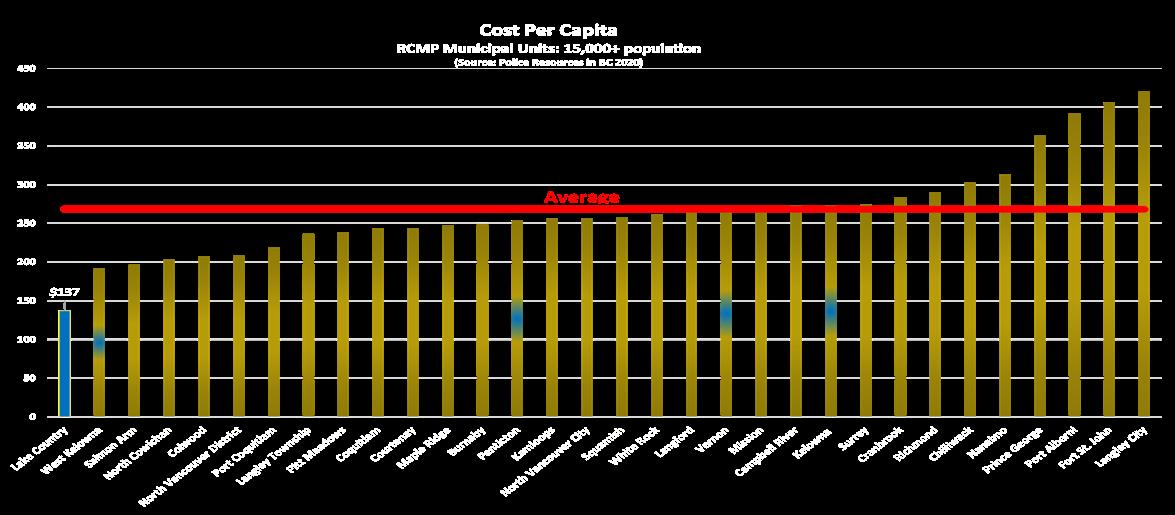
Our auditors, BDO LLP, have audited the 2022 financial statements and provided a clean audit opinion. The draft financial statements are contained in Attachment 1. The full financial statements were presented to Council by BDO LLP and by management at the May 9, 2023 Special Council meeting.
These financial statements have been prepared in accordance with generally accepted accounting principles for local governments following recommendations and guidance provided by Public Sector Accounting Standards (PSAS). The integrity and objectivity of these statements are management’s responsibility.
Relevant Observations:
A net financial position indicates the extent that net financial resources are available to fund future operations and expenditures. In 2022 the District moved to a net financial position of $8,716,578 compared to $14,519,118 in 2021. While this is a significant drop from the prior year, it is largely as a result of planned significant capital expenditures and we consider the net financial position to be quite healthy for funding future operations and expenditures.
2022 revenues were below budget by $15,719,622 with the actual amount being $36,912,102 and the 2022 budgeted amount being $52,631,724.
The majority of this difference is due to Government Transfers revenue coming in at $1,795,768 compared to budget of $17,528,923 for a difference of $15,733,155.
$14,116,025 was budgeted for Wastewater Treatment Plant Phase 5 to be grant funded which has not yet been received (still undetermined if this will eventually be received).
CFO Trevor James is not only interested in the sustainability of the financial position of Lake Country, he also spent his lunch hour on Earth Day planting trees under the direction of the Parks team at Jack Seaton Park.

The dip in 2021 and 2022 is largely attributable to the significant capital expenditures. The district spent $22,954,802 on tangible capital assets in 2021 and $15,973,412 in 2022. Figure 2 shows the trend of acquisition of tangible capital assets over the years:
The dip in 2021 and 2022 is largely attributable to the significant capital expenditures. The district spent $22,954,802 on tangible capital assets in 2021 and $15,973,412 in 2022. Figure 2 shows the trend of acquisition of tangible capital assets over the years:
Also contributing to this difference in Government Transfers revenue is $989,956 of deferred revenue relating to the Woodsdale Cultural Centre grant which will be recognized in 2023/24 as the project proceeds.
2022 revenues were $4,466,284 less than in 2021 ($36,912,102 in 2022 vs. $41,378,386 in 2021) primarily due to:
• Government transfers were $2,594,328 less, largely due to 2021 having $2.9 million of government grants recognized for the Multi-Generational Activity Centre (MAC).

• Developer contributions were $3,837,284 less, 2021 had some more significant Development Cost Charge (DCC) funded projects such as $2.5 million for the Wastewater Treatment Plant Effluent Disposal project funded by sewer DCCs and $1.4 million for Rail Trail land acquisition funded through parks DCCs.
• These were partially offset by increased tax revenue due to the 2022 tax increase, higher utility revenues due to increase in rates and additional users, higher interest on investments due to higher rates and higher investment balances.
2022 total expenses of $31,041,642 were $433,407 less than budget of $31,475,049, a 1.38% variance from the total budgeted expenses. Please see table “2022 Expenses Budget to Actual” for a breakdown by department.
2022 total expenses came in $2,049,527 higher than the $28,992,115 or 7.07% in 2021 which was expected due to significant cost increases largely driven by inflation. BC inflation was 6.9% for 2022. Please see table “Expenses – 2022 Actual to 2021 Actual” for breakdown by department.
Strategic Relevance and Community Sustainability
A strong financial position with adequate reserves will allow the District to work towards its strategic priorities and ensure ongoing financial viability. It is essential that local governments maintain adequate levels of reserve balances to mitigate current and future risks, ensure stable tax rates and demonstrate financial commitment to long range infrastructure and master plans.

Some items that are unique to PSAS financial reporting as follows:

• Separation of financial assets and non-financial assets – in typical financial statements of a business, a balance sheet is separated into three main categories – assets, liabilities, and shareholders’ equity. In public sector financial statements, total assets are not specifically presented. Assets are separated between “financial” assets and “non-financial” assets:
• Financial Assets are assets that generate cash flow and can be used to repay liabilities. Financial Assets include cash and cash equivalents and accounts receivables.
• Non-Financial Assets generally do not provide cash flow and include tangible capital assets and other assets that are utilized on a continuing basis for public purposes having a useful life beyond one year. These assets are reflected at net book value (initial cost less amortization to date) and not intended to be sold in the normal course of operations.
• Net Debt or Net Financial Assets – With this separation of financial assets and non-financial assets, a performance measure unique to public sector financial statements results. The difference between financial assets and liabilities either reflects a “net debt” or “net financial asset” position.
• Net Debt – A net debt position indicates the extent that debt and other liabilities have been taken on by the municipality to fund the delivery of services, investments in tangible capital assets and other transactions. Future revenue streams need to contemplate the requirement to repay debt obligations as they come due based on established repayment terms.
• Net Financial Assets – A net financial asset position indicates the extent that net financial resources are available to fund future operations and spending.
• The net debt and net financial assets will fluctuate from year to year depending on how much is spent on capital and how much surplus is recognized. However, the District should continue to see a net financial asset position as the reserves are held in line with the Reserve Policy adopted by Council.
• Accumulated Surplus or Deficit – the accumulated sum of non-financial assets and net financial assets. The District is in a “surplus” position. The surplus position reflects that net financial and physical resources are available to provide future services. If an entity was in a net deficit position, this would reflect that future revenues are required to finance historical operations.
This statement provides the budgeted and actual revenues and expenses of the District for the fiscal year. Revenues are presented by their sources of funds (i.e. taxation, user fees, government transfers, etc.) Expenses are presented by function or major program (i.e. Protective services, Water, Sewer, etc.) The accumulated surplus represents the accumulated results experienced by the City over the years.
Please see executive summary for summary of most significant changes in budget vs. actual and actual vs. prior year.
The District of Lake Country was presented with the Canadian Award for Financial Reporting from the Government Finance Officers Association of United States and Canada for its 2021 Annual Report. This is the seventh consecutive year the District has received the award which was established to encourage municipal governments throughout Canada to publish highquality financial reports and to provide peer recognition and technical guidance for officials preparing these reports.

Comparable to budget, slight increase over budget partially due to $266,011 of actual amortization compared to budget of $156,613 primarily in the IT infrastructure category.
Comparable to budget, came in slightly under budget due to requesting 18 RCMP offers but only being billed based on actuals which was closer to 14 for the year.
Transit costs came in $246,000 under budget due to still recovering ridership as well as repayment of BC Transit reserve in the form of reduced bills. Majority of remaining difference due to budgeted operating projects funded from reserves that were carried over into 2023.
Comparable to budget, slighty under budget due to final coding of an FTE.
Comparable to budget, slightly under budget due to some staffing vacancies in the year.
Creekside Theatre performance fees were $231,313 compared to budget of $60,000 however please note that programming revenues were $280,719 compared to budget of $65,000. Arena operating expenditures were $64,409 above budget however arena revenue was $84,985 above budget. Remaining difference attributable to higher than budgeted amortization on tangible capital assets.
Comparable to budget, a number of budgeted operating projects funded from reserves that were carried over into 2023 resulted in the actual for 2023 coming in below budget.
Comparable to budget, slight negative variance due to higher material/supply costs due to supply chain/inflationary pressures. Also had higher than budgeted revenues which offset the majority of this variance.
Interest expense was higher due to timing of new Fire Hall and Wastewater Treatment Plant Phase 4 loans.
Comparable to budget, slight expected increase due to inflationary increases
$596,000 increase in RCMP costs primarily due to being at approximately 14 officers for the majority of 2022 compared to 10-12 during 2021 as well as the new RCMP collective agreement coming into effect. $83,000 increase in Bylaw due to bylaw officers being hired part way through 2021 but being in effect for all of 2022. Fire expenses stayed the same however amortization increased by $117,000 as a result of the new Fire Hall being put into use.
Increase was expected as a result of high inflationary costs as well as $158,000 increase in Road Maintenance Services Contract in 2022.
Comparable to prior year, small increase due to inflationary increases as expected.
2021 had a $922,068 bad debt expense, when excluding this amount 2022 actual was $173,692 higher than 2021 which was expected due to adding planning & development staff in 2022.
$173,000 increase in theatre peformance fees (as noted above also a corresponding increase in revenues). Increased costs (and corresponding revenues) across this department as activities returned to pre-pandemic levels as well as impacted by the 6.9% inflation and even higher cost of fuel, materials, supplies etc.
Higher than prior year due to higher material/supply costs due to inflation as well as additional users.
2021 had $248,000 of operating projects (Liquid Waste Management Plan, Sewer Servicing Strategy Update and Okanagan Lake Outfall Assessment) compared to only $44,000 of these projects in 2022. When excluding these amounts 2022 was higher than 2021 which was expected as a result of higher material/supply costs due to supply chain/inflationary pressures.
Interest expense was higher due to new Fire Hall and Wastewater Treatment Plant Phase 4 loans.
Statement of Changes in Net Debt
Explains the changes in net debt, reconciling the opening to the closing balance of net debt reported in the Statement of Financial Position.
Statement of Cash Flows
Explains the changes to cash and cash equivalents, reconciling the opening to the closing balance of cash and cash equivalents reported in the Statement of Financial Position.
Notes to Financial Statements and Schedules
Provides further details on information provided in the financial statements noted above. The full listing of debt including what it is for has been provided in Attachment 2.
Schedule 1 – Schedule of Tangible Capital Assets
Summary of changes to the net book value of all District tangible capital assets and work in progress held by category.
Schedule 2 – Schedule of Accumulated Surplus
Summary of changes to reserves as well as the net investment in tangible capital assets.
Schedule 3 – Schedule of Segment Disclosure
Further details of the use of financial resources (revenue and expenses) by the District by function or segment.
Schedule 4 – Schedule of COVID-19 Restart Grant
This is a schedule required for the acceptance of the COVID-19 Safe Restart Grant received in November 2020 from the Provincial Government. This grant was recorded as revenue for 2020 with the amount not spent in 2020 moved into the stabilization reserve with the amount being drawn down as it gets spent.
Section 167 if the Community Charter describes the financial reporting requirements for local governments. Municipal financial statements for a fiscal year must be prepared by the Financial Officer and presented to Council for its acceptance. The financial statements are to be submitted to the Inspector of Municipalities by May 15th of the year following the end of the fiscal year.
CONSULTATION AND COMMUNICATION
The financial statements are available publicly on the District’s website and at Municipal Hall as well as are included in the annual report that is released in June.

Respectfully Submitted, Trevor James, CFO, Director of Finance & Administration
May 11, 2023
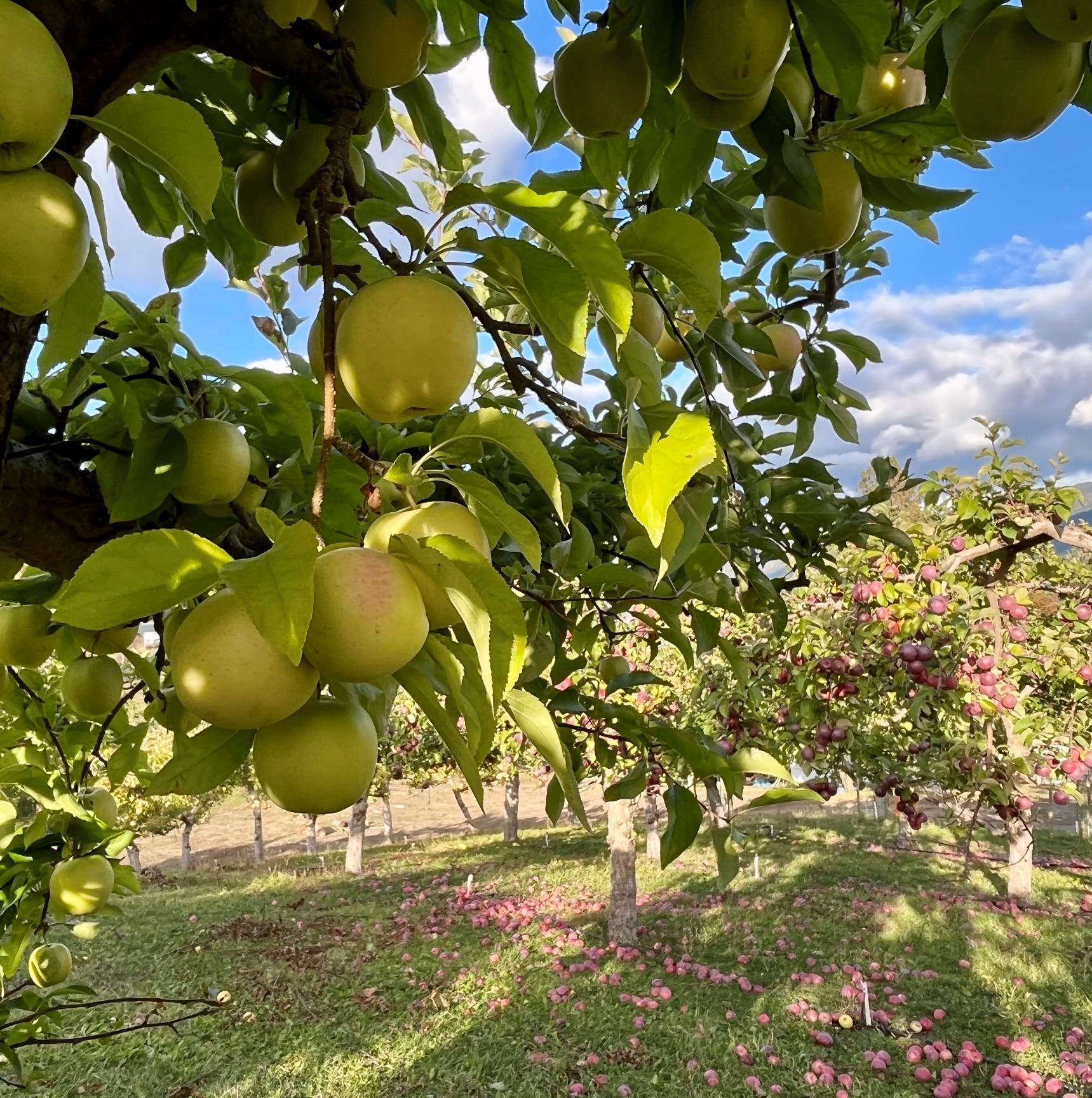
Municipal Hall
10150 Bottom Wood Lake Road
Lake Country, BC V4V 2M1
Tel: 250-766-5650
Fax: 250-766-0116
May 9, 2023

The Mayor and Council District of Lake Country
Mayor Ireland and Council,
In accordance with Section 167 of the Community Charter, I am pleased to present the 2022 Annual Financial Statements of the District of Lake Country for the fiscal year ended December 31, 2022. These statements include the Independent Auditors’ Report, the financial statements and the notes and schedules to the financial statements for the District of Lake Country.
The financial statements for the year ended December 31, 2022 were prepared by the District in accordance with Canadian Public Sector Accounting Standards. The integrity and objectivity of these statements are management’s responsibility. Management is also responsible for implementing and maintaining a system of good internal controls to safeguard the District’s assets and to provide reasonable assurance that reliable and consistent financial information is provided.
Council is responsible for ensuring management fulfills its responsibility for financial reporting and internal control.
The auditors, BDO Canada LLP, conduct an independent examination, in accordance with Canadian generally accepted auditing standards, and express their opinion regarding the Annual Financial Statements. The audit was planned and performed to obtain reasonable assurance as to whether the financial statements are free from material error or misstatement.

The District strives to ensure that services are effectively and efficiently delivered to meet Council’s and the community’s goals and vision. The District is committed to providing sound financial management and long-term strategic planning to achieve these objectives.
Respectively submitted,
Trevor James, CPA, CA Chief Financial OfficerWe have audited the financial statements of the District of Lake Country (the "District"), which comprise the statement of financial position as at December 31, 2022, and the statement of changes in net financial assets, statement of operations and accumulated surplus, and statement of cash flows for the year then ended, and notes and schedules to the financial statements, including a summary of significant accounting policies.
In our opinion, the accompanying financial statements present fairly, in all material respects, the financial position of the District as at December 31, 2022, and its results of operations and its cash flows for the year then ended in accordance with Canadian public sector accounting standards.

We have not audited, reviewed or otherwise attempted to verify the accuracy or completeness of Schedule 4 on page 26 of these financial statements.

We conducted our audit in accordance with Canadian generally accepted auditing standards. Our responsibilities under those standards are further described in the Auditor’s Responsibilities for the Audit of the Financial Statements section of our report. We are independent of the District in accordance with the ethical requirements that are relevant to our audit of the financial statements in Canada, and we have fulfilled our other ethical responsibilities in accordance with these requirements. We believe that the audit evidence we have obtained is sufficient and appropriate to provide a basis for our opinion.
Management is responsible for the preparation and fair presentation of these financial statements in accordance with Canadian public sector accounting standards, and for such internal control as management determines is necessary to enable the preparation of financial statements that are free from material misstatement, whether due to fraud or error.
In preparing the financial statements, management is responsible for assessing the District’s ability to continue as a going concern, disclosing, as applicable, matters related to going concern and using the going concern basis of accounting unless management either intends to liquidate the District or to cease operations, or has no realistic alternative but to do so.
Those charged with governance are responsible for overseeing the District’s financial reporting process.
Our objectives are to obtain reasonable assurance about whether the financial statements as a whole are free from material misstatement, whether due to fraud or error, and to issue an auditor’s report that includes our opinion. Reasonable assurance is a high level of assurance, but is not a guarantee that an audit conducted in accordance with Canadian generally accepted auditing standards will always detect a material misstatement when it exists. Misstatements can arise from fraud or error and are considered material if, individually or in the aggregate, they could reasonably be expected to influence the economic decisions of users taken on the basis of these financial statements.

As part of an audit in accordance with Canadian generally accepted auditing standards, we exercise professional judgment and maintain professional skepticism throughout the audit. We also:
Identify and assess the risks of material misstatement of the financial statements, whether due to fraud or error, design and perform audit procedures responsive to those risks, and obtain audit evidence that is sufficient and appropriate to provide a basis for our opinion. The risk of not detecting a material misstatement resulting from fraud is higher than for one resulting from error, as fraud may involve collusion, forgery, intentional omissions, misrepresentations, or the override of internal control.
Obtain an understanding of internal control relevant to the audit in order to design audit procedures that are appropriate in the circumstances, but not for the purpose of expressing an opinion on the effectiveness of the District's internal control.
Evaluate the appropriateness of accounting policies used and the reasonableness of accounting estimates and related disclosures made by management.
Conclude on the appropriateness of management’s use of the going concern basis of accounting and, based on the audit evidence obtained, whether a material uncertainty exists related to events or conditions that may cast significant doubt on the District’s ability to continue as a going concern. If we conclude that a material uncertainty exists, we are required to draw attention in our auditor’s report to the related disclosures in the financial statements or, if such disclosures are inadequate, to modify our opinion. Our conclusions are based on the audit evidence obtained up to the date of our auditor’s report. However, future events or conditions may cause the District to cease to continue as a going concern.
Evaluate the overall presentation, structure and content of the financial statements, including the disclosures, and whether the financial statements represent the underlying transactions and events in a manner that achieves fair presentation.
We communicate with those charged with governance regarding, among other matters, the planned scope and timing of the audit and significant audit findings, including any significant deficiencies in internal control that we identify during our audit.
Chartered Professional Accountants
Kelowna, British Columbia
May 11, 2023
See accompanying notes to the financial statements.


For the year ended December 31 2022
Net inflow (outflow) of cash and cash equivalents related to the following activities
See accompanying notes to the financial statements.
For the year ended December 31, 2022
The notes to the financial statements are an integral part of the statements. They explain the significant accounting and reporting policies and principles underlying these statements. They also provide relevant supplementary information and explanations which cannot be conveniently expressed in the financial statements.
The District of Lake Country (“the District”) was incorporated under the laws of British Columbia in 1995 and is engaged in the operation of a municipality.
The financial statements have been prepared in accordance with Canadian Public Sector Accounting Standards.
The following is a summary of the District’s significant accounting policies:
The District’s resources and operations are segregated into General, Water, Sewer and Statutory Reserve Funds for accounting and financial reporting purposes. Each of these funds is further segregated into operating and capital funds, where applicable. The financial statements include all of the accounts of these funds.
The financial statements are prepared using the accrual basis of accounting. The accrual basis of accounting records revenue as it is earned and measured.
Management classifies all term deposits and highly liquid investments that are cashable on demand as cash equivalents.
Tangible capital assets are recorded at cost which includes all amounts that are directly attributable to the acquisition, construction, development or betterment of the asset. The cost, less residual value, of the tangible capital assets is amortized on a straight-line basis over their estimated useful lives.
Notes to the Financial Statements
For the year ended December 31, 2022
The estimated useful lives are as follows:
Water, sewer, and other structures 25 - 80 years
One-half of the annual amortization is charged in the year of acquisition and in the year of disposal.
Work in Progress is valued at cost and represents capital projects under construction but not yet ready for use. Amortization commences once the individual projects are capitalized.
Tangible capital assets received as contributions are recorded at their fair value at the date of receipt and also are recorded as revenue.
The District has numerous works of art located throughout the District which are not reflected in these financial statements due to the subjectivity as to their value.
Supplies on hand
Supplies are charged to operations when purchased.
The District capitalizes interest on temporary borrowing until the completion of the project that is to be financed by debenture debt at the current rate of the District’s short-term borrowing.
Outstanding debenture debt is reported net of sinking fund balances.
Debt charges
Interest on debt is charged to current operations. Interest charges are accrued for the period from the date of the latest interest payment to the end of the year.
For the year ended December 31, 2022
Contaminated sites are a result of contamination being introduced into air, soil, water or sediment of a chemical, organic or radioactive material or live organism that exceeds an environmental standard. The liability is recorded net of any expected recoveries. A liability for remediation of contaminated sites is recognized when all of the following criteria are met:
• an environmental standard exists;
• contamination exceeds the environmental standard;
• the District is directly responsible and accepts responsibility;
• it is expected that future economic benefits will be given up; and
• a reasonable estimate of the amount can be made.
The liability includes all costs directly attributable to remediation activities including post remediation operations, maintenance and monitoring.
The District issues its debt instruments through the Municipal Finance Authority. As a condition of these borrowings, a portion of the debenture proceeds is withheld by the Municipal Finance Authority as a debt reserve fund. The District also executes demand notes in connection with each debenture whereby the District may be required to loan certain amounts to the Municipal Finance Authority. These demand notes are contingent in nature, and are detailed as follows:
Non-statutory reserves represent an appropriation of surplus for specific purposes. Reserves for future capital expenditures represent funds to finance incomplete capital projects. Statutory reserves are restricted by the Community Charter and the associated municipal bylaws that established the reserves.
For the year ended December 31, 2022
Taxes are recognized as revenue in the year they are levied. Through the BC Assessment appeal process property assessment values may be adjusted through a supplementary roll. Decreases or increases of taxation as a result of these re-assessments are recognized at the time they are awarded.
Fees and charges for protective, transportation, environmental, development, community and customer services, water and sewer fees are recorded on the accrual basis and recognized as earned, which is usually when services are provided.
Investment income is recorded on the accrual basis and recognized when earned.
Government transfers are recognized as revenue in the period that the transfer is authorized, eligibility criteria, if any, have been met by the District, and a reasonable estimate of the amount to be received can be made.
Developer contributions are recognized as revenue during the period in which the related costs are incurred or when infrastructure is turned over to the District.
Expenses are recorded in the period in which the goods or services are acquired and a liability is incurred.
The preparation of the financial statements requires management to make estimates and assumptions that affect the reported amounts of assets and liabilities at the date of the financial statements, and the reported revenue and expenses during the reporting period. Significant areas requiring the use of management estimates relate to the determination of employee benefit plans, allowance for doubtful accounts receivable, provision for contingencies and tangible capital assets estimated useful life and related amortization. Actual results could differ from management’s best estimates as additional information becomes available. Adjustments, if any, will be reflected in the financial statements in the period that the change in estimate is made, as well as in the period of settlement if the amount is different.
The budget adopted by Mayor and Council on March 15, 2022 was not prepared on a basis consistent with that used to report actual results (Public Sector Accounting Standards). The budget was prepared on a modified accrual basis while Public Sector Accounting Standards require a full accrual basis. The budget figures anticipated using surpluses accumulated in previous years to reduce current year expenditures in excess of current year revenues to $21,156,675. In addition, the budget expensed all tangible capital asset expenditures. As a result, the budget figures presented in the statement of operations and the statement of changes in net financial assets (net debt) represent the budget adopted by Mayor and Council with adjustments as follows:
Notes to the Financial Statements
For the year ended December 31, 2022

Add:
Acquisition of tangible capital assets
Long-term debt principal payments and actuarial adjustments
Less:
Transfers from surpluses and reserves
Proceeds from long term debt
Proceeds from disposal of tangible capital assets
Transfer from equity in tangible capital assets for amortization
Financial plan (Budget) surplus per statement of operations
PS 3280 – Asset Retirement Obligations
This new section provides guidance on how to account for and report a liability for asset retirement obligations. An asset retirement obligation is a legal obligation associated with the retirement of a tangible capital asset. This section applies to fiscal years beginning on or after April 1, 2022, with early adoption permitted.
For the year ended December 31, 2022
Cash and cash equivalents consist of cash and short-term investments with maturities of 90 days or less from the date of acquisition. Cash and cash equivalents are recorded at cost and are comprised of the following:
Included in 2022 cash and cash equivalents is $3,224,923 (2021 - $2,669,051) relating to performance deposits, the use of which is subject to certain restrictions.
The District has an operating line of credit with the Toronto Dominion Commercial Bank for an authorized amount of $1,500,000, bearing interest at bank prime rate. At December 31 the balance outstanding on the operating line of credit was $nil (2021 - $nil).
Accounts receivable are recorded net of allowance and is comprised of the following:
Notes to the Financial Statements
For the year ended December 31, 2022
Accounts payable and accrued liabilities are comprised of the following:
The District records deferred revenue for funds received in advance on services not yet rendered and is recognized as revenue during the period in which the services are provided. Because these funds are restricted in nature, they are shown as a liability.
Pursuant to the provisions of the Local Government Act, development cost charges (“DCC’s”) and parkland acquisition funds are held in statutory reserve funds for the purposes for which the charges have been imposed. When the related costs are incurred, the DCC’s and parkland acquisition funds are recognized as revenue. Because these funds are restricted in nature, they are shown as a liability.
Notes to the Financial Statements
For the year ended December 31, 2022
In accordance with Section 562 of the Local Government Act, no DCC's were waived or reduced for eligible development as defined under Section 563 of the Act.
The balances of the DCC reserves can be itemized as follows:
For the year ended December 31, 2022
The principal repayments on long-term debt required in each of the five years and thereafter are as follows:
For the year ended December 31, 2022
Regional District of Central Okanagan
Regional District debt is, under the provisions of the Local Government Act, a direct, joint and several liability of the District and each electoral area and member municipality within the Regional District, including the District of Lake Country. The loan agreements with the Regional District of Central Okanagan and the Municipal Finance Authority provide that if at any time the scheduled payments provided for in the agreements are not sufficient to meet the Authority’s obligation with respect to such borrowing, the resulting deficiency becomes a liability of the member municipalities.
The District is currently engaged in certain legal actions, the outcome of which is not determinable at this time. Accordingly, no provision has been made in the accounts for these actions. The amount of loss, if any, arising from these actions will be recorded in the accounts in the period in which the loss becomes estimable and likely.
The District and its employees contribute to the Municipal Pension Plan (a jointly trusted pension plan). The board of trustees, representing plan members and employers, is responsible for administering the plan, including investment of the assets and administration of benefits. The plan is a multi-employer defined benefit pension plan. Basic pension benefits are based on a formula. As at December 31, 2021 the plan has about 227,000 active members and approximately 118,000 retired members. Active members include approximately 42,000 contributors from local government.
Every three years, an actuarial valuation is performed to assess the financial position of the plan and adequacy of plan funding. The actuary determines an appropriate combined employer and member contribution rate to fund the plan. The actuary’s calculated contribution rate is based on the entry-age normal cost method, which produces the long-term rate of member and employer contributions sufficient to provide benefits for average future entrants to the plan. This rate maybe adjusted for the amortization of any unfunded actuarial liability.
For the year ended December 31, 2022
The most recent valuation for the Municipal Pension Plan as at December 31, 2022 indicated a $3,761 million funding surplus for basic pension benefits on a going concern basis.
The District paid $706,234 (2021 - $682,711) for employer contributions, while employees contributed $641,780 (2021 - $593,963) to the plan in fiscal 2022
The next valuation will be as at December 31, 2024 with results available in 2025
Employers participating in the plan record their pension expense as the amount of employer contributions made during the fiscal year (defined contribution pension plan accounting). This is because the plan records accrued liabilities and accrued assets for the plan in aggregate, resulting in no consistent and reliable basis for allocating the obligation, assets and cost to individual employers participating in the plan.
The District holds an irrevocable letter of credit in the amount of $97,540. The letter of credit is being held as a deposit on a capital project being administered by the Department of Fisheries and Oceans.
The District has entered into various agreements and contracts for services with periods ranging from one to twenty years.
Notes to the Financial Statements
For the year ended December 31, 2022
In 2022 the District collected $13,042,798 (2021 - $11,978,991) on behalf of other taxing jurisdictions and transferred this amount to those other authorities. The collections and transfers are itemized as follows:
For the year ended December 31, 2022
In 2022 the District received and recorded as revenue the following transfers:
As of December 31, the District is holding letters of credit in the amount of $7,109,966 (2021 - $6,444,590), which are received as security related to performance deposits.
For the year ended December 31, 2022
The District of Lake Country is a diversified municipal government that provides a wide range of services to its citizens. For management reporting purposes the District’s operations and activities are organized and reported by funds and departments. The General Fund reports on property tax supported operations, which include services provided by the District to citizens such as general government, protective, transportation, environmental, planning and development and community and customer services. The utility operations are comprised of the water and sewer systems, each accounting for its own operations and programs within their own funds. Operating results reported by the following segments is included in Schedule 3.
General Government operations are primarily funded by property taxation and business tax revenues. The expenses within the department are for legislative, general administration, human resources and finance functions within the municipality. The general revenue reported under the department includes revenues associated with taxation, business licence revenues and payments in-lieu of taxes. These revenues have not been apportioned to other departments supported by the General Fund.
Protective services are comprised of police services provided by the Royal Canadian Mounted Police and fire services. The mandate of the police is to ensure the safety of the lives and property of citizens, preserve peace and good order, prevent crimes from occurring, detect offenders, and enforce the law. The fire department is responsible for effective fire protection and public safety services to the District. This includes fire prevention, fire safety inspections, fire control and/or suppression. Bylaw enforcement is also reported under this department.
Transportation services are responsible for the delivery of municipal public works services related to the planning, development and maintenance of roadway and drainage systems and street lighting.
Environmental services are comprised of transit, garbage and recycling services, as well as the Lake Country hydroelectric generating station.
Planning and Development services monitor compliance with Council policies governing subdivision, land use and building inspection. This department also provides economic development services within the municipality.
Parks and Recreation services provide services related to recreation, leisure and culture. The facilities managed within this department include parks, arena, seniors centre, community theatre and the community complex. 18
For the year ended December 31, 2022
Water systems
The Water department provides safe drinking water to citizens of Lake Country. Revenue and expenses represent the amounts that are directly attributable to the function of the water department. Water is accounted for in its own fund.
The Sewer department manages the wastewater treatment plants and sewer collection system. Sewer is accounted for in its own fund.
Total expenses by object are itemized in Schedule 3 – Segment Disclosure.
Certain comparative figures have been reclassified to conform to the presentation format adopted for the current year.
of Lake Country Schedule 1Schedule of Tangible Capital
For the Year Ended December 31
District of Lake Country Schedule 1Schedule of Tangible Capital Assets
For the Year Ended December 31
Schedule 2Schedule of Accumulated Surplus
For the year ended December 31 , 2022
Schedule 3Schedule of Segment Disclosure




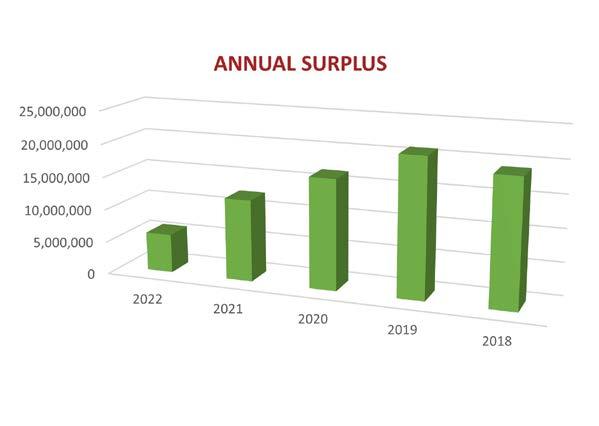
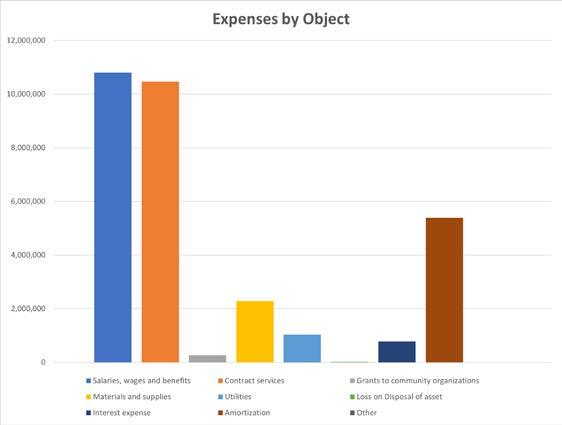




*Multi-familydwellingpermitsrepresentthenumberofpermitsissuedratherthanthenumberof unitsconstructed.Onemulti-familypermitmayconsistoftwoormoreunits.

